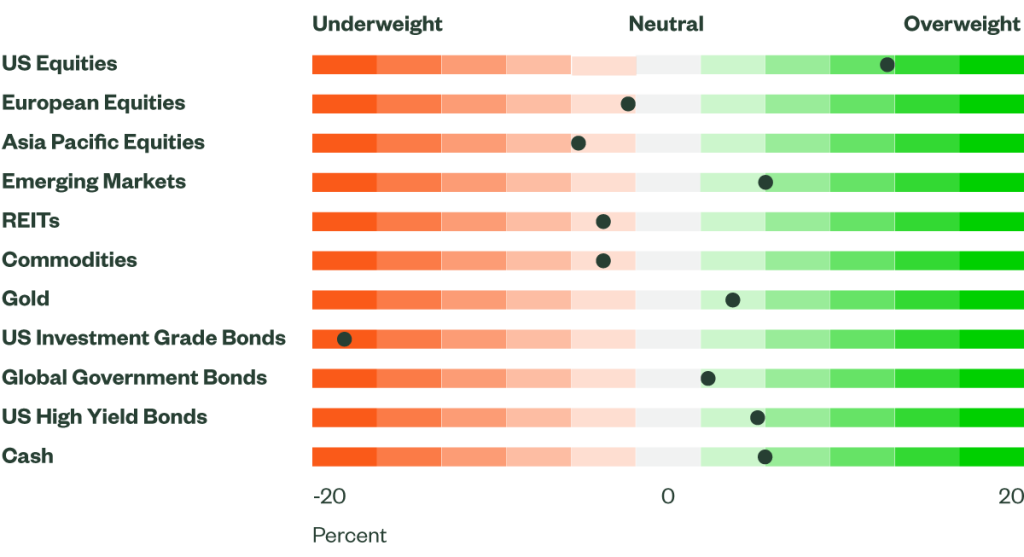By: Robert W Spencer, CFA, Senior Portfolio Strategist and
Keith M Snell, CFA, Portfolio Analyst
Each month, the SSGA Investment Solutions Group (ISG) meets to debate and ultimately determine a Tactical Asset Allocation (TAA) to guide near-term investment decisions for client portfolios. Here we report on the team’s most recent discussion.
Figure 1: Asset Class Views Summary

Macro Backdrop
Internally, State Street Global Advisors has held the view that a soft landing is still achievable as long as growth slows but remains positive; inflation continues to decelerate; and the Fed begins easing monetary policy. Over the past month, we have seen progress in macroeconomic data, supporting this view. Growth has moderated in the United States (US) — recent inflation data indicate that disinflation is back — and the Fed’s commentary has become more dovish, raising hopes for an expected cut in September.
The US economy exhibited more signs of moderation, while economic activity data outside of the US disappointed. Generally, we experienced weaker activity, better labor market dynamics, and some signs of stress for consumers. Global manufacturing activity seems to have bottomed out but hasn’t been able to recover — with June purchasing managers’ index (PMI) readings falling across many countries. Services, which has been a source of strength, is softening globally as PMIs in the US and Japan began falling into contraction territory in June.
Labor data, though mixed, continued to illustrate a more balanced market, with the job openings to unemployment ratio falling to 1.22 — very close to pre-COVID levels. For consumers, the backdrop is not dire, but delinquencies have picked up, wage growth has continued to moderate, and unemployment has risen to 4.1%.
June’s consumer price index report was welcome news and it followed inflation readings from the previous month, which showed easing price pressures. However, producer prices disappointed – June’s data outpaced expectations and the previous month’s reading was revised higher. Despite this, there are other signs of relief as price-paid measures for both manufacturing and services fell for the second consecutive month.
Furthermore, the number of small businesses planning to hike prices continued to fall, according to the National Federation of Independent Business’ small business survey. While there are still some risks to the upside, recent data is encouraging. The Fed is likely to need another month or two of progress before becoming comfortable with easing rates. However, board members do appear more optimistic that inflation will return to target.
Directional Trades and Risk Positioning
Over the second half of June, our Market Regime Indicator (MRI) started to move up into a normal risk aversion regime as the unexpected call for snap elections in France injected some turbulence into global equity and currency markets. More recently, conditions eased, and MRI settled back into low risk — a regime that is typically beneficial for equity markets.
From a quantitative perspective, our forecast for equities improved and remains strong, while our fixed income expectations declined.
Broad strength across multiple factors in our quantitative model buoys our equity forecast. Positive equity returns this year have stretched valuations, but balance sheets are resolute and analysts’ expectations for both earnings and sales are robust. Additionally, price momentum supports further appreciation for equities.
After improving last month, expected returns for fixed income fell in July due to interest rate momentum, which suggests a slight bias for higher rates. Q1 US gross domestic product (GDP) was below expectations, but nominal GDP is still running well above long-term treasury yields, implying rates should continue to rise. Our forecast for high yield is positive but weaker than last month. The current level of government yields suggests financing costs are high and spreads should widen. However, lower equity volatility and positive equity momentum support our outlook.
Given the improvement in risk appetite and better equity forecasts, we purchased equities using proceeds from aggregate bonds, high yield bonds, and cash.
Relative Value Trades and Positioning
Within equities, our expectations for the US improved, but forecasts for non-US developed market equities declined. Elsewhere, prospects for emerging markets remained favorable. In the US, an upgraded macro score, particularly the macro cycle factor, pushed our forecasts higher. The US appeared attractive across all factors except value.
For Europe, our diminished forecast was driven by expectations for sales and earnings, which deteriorated further and remained negative. Despite healthy balance sheets and attractive valuations, price momentum is only neutral.
Emerging markets are bolstered by firm quality and sentiment indicators. During the rebalance, we reduced our exposure to European equities, reallocating proceeds to US large-cap and emerging market equities.
On the fixed income side, slightly weaker bond forecasts prompted us to reduce exposure to long government bonds and redeploy into cash. Cash offers a generous yield and can help mitigate any bond volatility resulting from geopolitical uncertainty.
After accounting for relative value and directional trades, the overall portfolio sees a modest increase in cash holdings. Following the rebalance, we hold an overweight to cash, long government bonds, and high yield bonds.
Finally, at the sector level, we maintained allocations to technology and energy, while rotating from industrials into communication services. Energy remained attractive due to favorable valuations, good balance sheet health, beneficial macro factors, robust sales, and strong earnings expectations. Stout price momentum, advantageous macro factors, and excellent sentiment indicators helped to uphold our constructive outlook for technology.
Our forecast for industrials contracted due to collapsed sales and earnings expectations. Elsewhere, softer price momentum and macro factors pushed the sector down in our rankings. Our improved outlook for communication services was driven by better sentiment and sturdy price momentum with the sector ranking near the top across both factors.
Originally Posted July 22nd, 2024, SSGA
PHOTO CREDIT: https://www.shutterstock.com/g/chanawut13
Via SHUTTERSTOCK
Disclosure
Marketing Communication
State Street Global Advisors Worldwide Entities
The whole or any part of this work may not be reproduced, copied or transmitted or any of its contents disclosed to third parties without SSGA’s express written consent.
The views expressed are of Investment Solutions Group through the period ended 10 July 2024 and are subject to change based on market and other conditions.
This document contains certain statements that may be deemed forward looking statements. Please note that any such statements are not guarantees of any future performance and actual results or developments may differ materially from those projected.
The information provided does not constitute investment advice and it should not be relied on as such. It should not be considered a solicitation to buy or an offer to sell a security. It does not take into account any investor’s particular investment objectives, strategies, tax status or investment horizon. You should consult your tax and financial advisor.
The information contained in this communication is not a research recommendation or ‘investment research’ and is classified as a ‘Marketing Communication’ in accordance with the Markets in Financial Instruments Directive (2014/65/EU) or applicable Swiss regulation. This means that this marketing communication (a) has not been prepared in accordance with legal requirements designed to promote the independence of investment research (b) is not subject to any prohibition on dealing ahead of the dissemination of investment research.
This document provides summary information regarding the Strategy. This document should be read in conjunction with the Strategy’s Disclosure Document, which is available from SSGA. The Strategy Disclosure Document contains important information about the Strategy, including a description of a number of risks.
The trademarks and service marks referenced herein are the property of their respective owners. Third party data providers make no warranties or representations of any kind relating to the accuracy, completeness or timeliness of the data and have no liability for damages of any kind relating to the use of such data.
All information is from State Street Global Advisors unless otherwise noted and has been obtained from sources believed to be reliable, but its accuracy is not guaranteed. There is no representation or warranty as to the current accuracy, reliability or completeness of, nor liability for, decisions based on such information and it should not be relied on as such.
Past performance is not a reliable indicator of future performance.
Investing involves risk including the risk of loss of principal.
Equity securities may fluctuate in value and can decline significantly in response to the activities of individual companies and general market and economic conditions.
Because of their narrow focus, sector investing tends to be more volatile than investments that diversify across many sectors and companies.
This communication is directed at professional clients (this includes eligible counterparties as defined by the appropriate EU regulator) who are deemed both knowledgeable and experienced in matters relating to investments. The products and services to which this communication relates are only available to such persons and persons of any other description (including retail clients) should not rely on this communication.
Investing in foreign domiciled securities may involve risk of capital loss from unfavorable fluctuation in currency values, withholding taxes, from differences in generally accepted accounting principles or from economic or political instability in other nations. Investments in emerging or developing markets may be more volatile and less liquid than investing in developed markets and may involve exposure to economic structures that are generally less diverse and mature and to political systems which have less stability than those of more developed countries.
Investing in REITs involves certain distinct risks in addition to those risks associated with investing in the real estate industry in general. Equity REITs may be affected by changes in the value of the underlying property owned by the REITs, while mortgage REITs may be affected by the quality of credit extended. REITs are subject to heavy cash flow dependency, default by borrowers and self-liquidation. REITs, especially mortgage REITs, are also subject to interest rate risk (i.e., as interest rates rise, the value of the REIT may decline).
There are risks associated with investing in Real Assets and the Real Assets sector, including real estate, precious metals and natural resources. Investments can be significantly affected by events relating to these industries.
Bonds generally present less short-term risk and volatility than stocks but contain interest rate risk (as interest rates rise, bond prices usually fall); issuer default risk; issuer credit risk; liquidity risk; and inflation risk. These effects are usually pronounced for longer-term securities. Any fixed income security sold or redeemed prior to maturity may be subject to a substantial gain or loss.
Investing in commodities entails significant risk and is not appropriate for all investors. Commodities investing entail significant risk as commodity prices can be extremely volatile due to a wide range of factors. A few such factors include overall market movements, real or perceived inflationary trends, commodity index volatility, international, economic and political changes, change in interest and currency exchange rates.
Illiquid risk/Asset investments may have difficulty in liquidating an investment position without taking a significant discount from current market value, which can be a significant problem with certain lightly traded securities.



